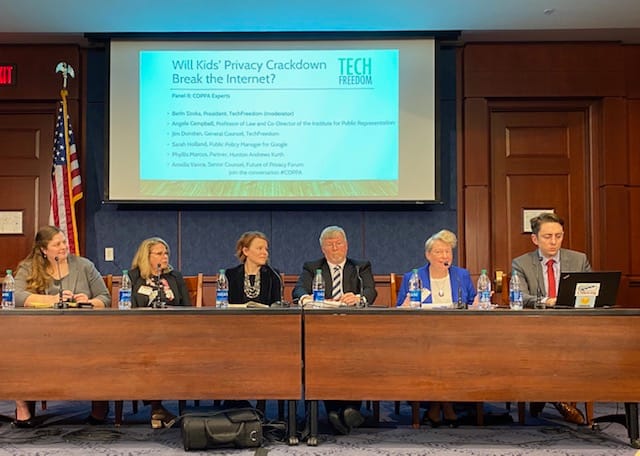FTC Settlement with YouTube Has Creators Upset and Worried About FTC Approach to Children’s Privacy
WASHINGTON, January 14, 2020 – Google’s decision to require all content creators for YouTube to designate whether their videos are intended for children is negatively impacting online free speech, a bevy of influencers said at a TechFreedom event on Monday. The market-oriented non-profit organized p

WASHINGTON, January 14, 2020 – Google’s decision to require all content creators for YouTube to designate whether their videos are intended for children is negatively impacting online free speech, a bevy of influencers said at a TechFreedom event on Monday.
The market-oriented non-profit organized panels on Monday of YouTube content creators to discuss their fears that the Children’s Online Privacy Protection Act has spurred changes – in the name of protecting children – that are detrimental to children.
The changes in YouTube’s video tagging policy is apparently the result of Google’s $170 million settlement with the Federal Trade Commission and the New York attorney general for alleged violations of the COPPA. That 1998 law prohibits severely limits companies from collecting data about children under 13, and YouTube was accused of violating that law.
YouTube, in term, is requiring its content creators to affirmatively comply with COPPA: “If you fail to set your audience accurately, you may face compliance issues with the FTC or other authorities, and we may take action on your YouTube account,” according to YouTube’s help-center document on the topic.
The content creators speaking at the TechFreedom event all agreed that YouTube’s changes have significantly impacted their businesses as they try to adapt to vague new restrictions.
Harry Jho, the creator of Mother Goose Club with six million subscribers and billions of views on YouTube, said he had to alter Mother Goose Club’s business plan and significantly reduce potential content.
Jho’s primary audience is children under the age of five. However, parents’ and grandparents’ accounts show up in the account because most children that age do not have a personal device and account.
Mother Goose Club only receives data for viewers ages 13 and up; the company cannot gather viewer information or send fans private emails. The fans in the comment section initiate communication.
Lawyer and vlogger Jeremy Johnston said that audience interaction is what makes YouTube different from television. Johnston, who runs J House Vlog with his wife, has two million subscribers and have created a community through interaction with their fans by responding to comments and questions.
Johnston was working on J House Junior, a vlog specific for YouTube Kids, but said he had to shut down production because of YouTube’s new policy.
COPPA was intended to put parents in charge, Johnston said. But in practice, he continued, the law circumvents the parents and makes creators liable. Creators, he said, don’t have control of Google’s platform. Instead, COPPA is protecting children from their parent’s choices, said Johnston.
The FTC’s last major regulatory change to COPPA was in 2013. In July 2019, the agency issued a proposed regulation with additional changes regarding content that is deemed to be targeting children.
But Angela Campbell, a law professor at Georgetown University, made clear that it was not the FTC that called for YouTube comments or playlists to be turned off — it was YouTube.
Campbell said that content creators should move in the direction of data minimization, limiting the personal information that organizations can use or acquire.
To Jackie, the creator of NerdECrafter, COPPA has detrimental consequences for female entrepreneurs. Because female creators often use tools like dolls or watercolors, she said, those items might seem like child-like interests and are therefore flagged as child-like content. But Jackie said that she has data showing 85 percent of her audience are adults.
Jackie believes that creators need a concise definition of “child content” because there are crossovers in the crafting community.
As a result of the new YouTube policy, Jackie is taking steps to make her content seem more “adult”-related, rather than child-directed.
Forrest, or KreekCraft, as he is known online to his thousands of subscribers, said the internet isn’t as “black and white” anymore. In response to the moderator asking what he would say to the FTC, he pleaded the FTC to collaborate with content creators before engaging in activities – like the YouTube settlement – that significantly affect them.
Because kids do not watch television as much as YouTube, kids will not abandon the platform, said Forrest. But, he said, they may start watching non-child videos because that will be the only accessible content.








